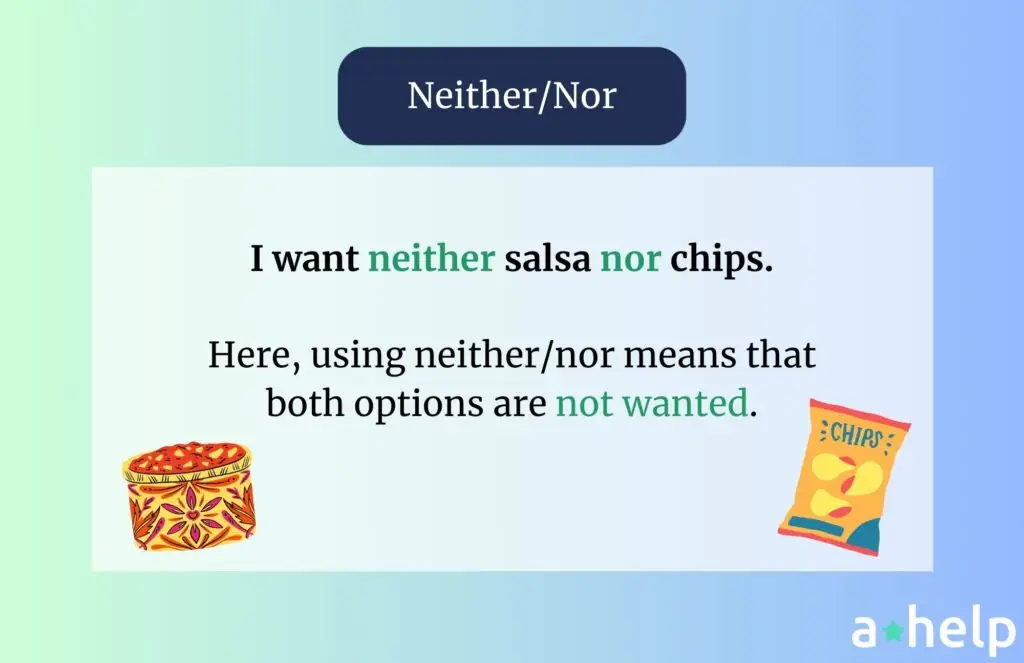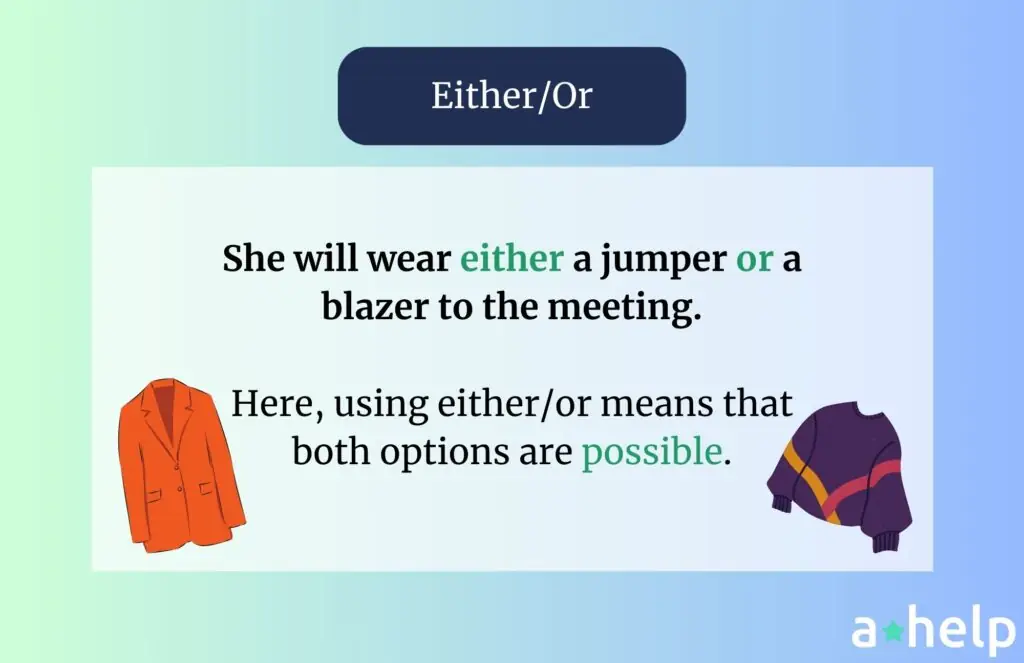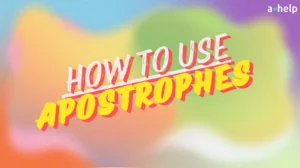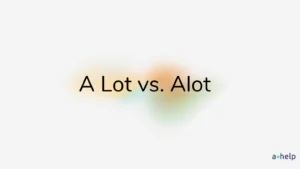Conjunctions in English are like the glue that holds our sentences together and makes sure our ideas don’t just fall apart. Among these, either/or and neither/nor are often ‘guardians’ of choices and decisions, what help us express options and exclusions. While either/or opens up possibilities by offering alternatives, neither/nor denies both options. So, whether you’re deciding between pizza or pasta for dinner or choosing neither because you’re on a health kick, these conjunctions have got you covered. We, in turn, will explain how to use them properly and check grammar mistakes in the future!

✅ AI Essay Writer ✅ AI Detector ✅ Plagchecker ✅ Paraphraser
✅ Summarizer ✅ Citation Generator
How to Use Neither/Nor
The conjunction “neither/nor” is used to negate two options or elements, indicating that neither of the two is true or acceptable. You may ask, “What even is a conjunction?” To put it cimply, conjunctions are words or phrases meant to coordinate the words in a sentence.

For example, “Grace likes neither tea nor coffee.” In this sentence, the speaker states that Grace does not like tea and also does not like coffee.
Another example is, “Neither the red shirt nor the blue shirt fits me.” Here, neither/nor is used to express that both shirts do not fit.
When using neither/nor, it’s important that the elements it connects are parallel in structure. For instance, “Neither studying all night nor sleeping in will help you pass the exam” is correct because both options are gerund phrases.
When neither/nor is used with a verb, the verb should agree with the subject closest to it. For example, “Neither the students nor the teacher is ready for the test” is correct because the verb “is” agrees with the singular noun “teacher.”
| ❌ Neither the cat or the dog was outside. | The conjunction “or” should be replaced with “nor” to correctly use the neither/nor construction. | ✅ Neither the cat nor the dog was outside. |
| ❌ She likes neither apples, oranges, nor bananas. | Neither/nor should be used to connect only two items. | ✅ She likes neither apples nor oranges. or ✅ She likes neither oranges nor bananas. |
| ❌ Neither of them are going to the party. | The verb “are” should agree with the subject “neither,” which is singular. | ✅ Neither of them is going to the party. |
| ❌ Neither he likes to read nor to write. | The structure of the sentence is incorrect. | ✅ He likes neither to read nor to write. |
Now let’s sort out the use of “either/or.”
How to Use Either/Or
The conjunction “either/or” is used to present two mutually exclusive options or alternatives. Either/or implies that a choice must be made between the two, but not both.

For example, “You can either watch a movie or read a book tonight.” In this sentence, the speaker is given a choice between two activities.
Another example is, “Either John or Mary will attend the class.” Here, either/or is used to indicate that only one of the two people will attend, not both.
A common mistake with either/or is using it to connect more than two items, which can lead to confusion very easily. For instance, “You can either have cake, ice cream, or cookies for dessert” is incorrect. Instead, it should be rephrased to “You can have cake, ice cream, or cookies for dessert” or use “either” with just two options.
To avoid mistakes, ensure that either/or connects only two elements and that these elements are parallel in structure. For example, “You can either study hard for the exam or relax and take it easy” is correct because both options are infinitive phrases. Let’s look at some other examples so you get the gist of it.
| ❌ Either the cake and the pie are delicious. | The conjunction “and” should be replaced with “or” to correctly use the either/or construction. | ✅ Either the cake or the pie is delicious. |
| ❌ You can either study hard, take it easy, or relax during the weekend. | Either/or should be used to connect only two items. | ✅ You can either study hard or take it easy during the weekend. |
| ❌ Either of them is going to the party. | The verb “is” should agree with the plural subject “them.” | ✅ Either of them are going to the party. |
| ❌ She will either go to the cinema but stay at home. | The conjunction “but” should be replaced with “or.” | ✅ She will either go to the cinema or stay at home. |
| ❌ Either he likes playing football or basketball. | The structure of the sentence is incorrect. | ✅ He likes either playing football or playing basketball. |
Famous Saying Including Neither/Nor and Either/Or
We hope that know you know the difference between these two conjunctions and using them will be a breeze for you. Such phrases are very common in English language and literature, so it only felt fitting to include some famous saying to demonstrate the rules once more.
Either/Or:
- “You can either be a victim of the world or an adventurer in search of treasure.” – Paulo Coelho
- “You must either modify your dreams or magnify your skills.” – Jim Rohn
- “Either write something worth reading or do something worth writing.” – Benjamin Franklin
- “In this world, you’re either growing or you’re dying, so get in motion and grow.” – Lou Holtz
- “You can either have excuses or results, not both.” – Arnold Schwarzenegger
- “Either you run the day, or the day runs you.” – Jim Rohn
- “You are either in your bed or in your shoes, so it pays to invest in both.” – John Wildsmith
- “Life is a series of choices. Today yours. Either choose wisely or live with the consequences.” – Lecrae
Neither/Nor:
- “I am neither especially clever nor especially gifted. I am only very, very curious.” – Albert Einstein
- “I was neither a genius nor a fool, but I was determined.” – Robert Ballard
- “Neither a borrower nor a lender be; For loan oft loses both itself and friend.” – William Shakespeare, Hamlet
- “I am neither an optimist nor pessimist, but a possibilist.” – Max Lerner
- “She’s neither a saint nor a sinner, just a regular person.” – Common expression
- “Neither love nor hate can change the past.” – Proverb
Here you go! We hope you find our guide helpful and now know more about using “neither/nor” and “either/or.”
FAQ
Follow us on Reddit for more insights and updates.





Comments (0)
Welcome to A*Help comments!
We’re all about debate and discussion at A*Help.
We value the diverse opinions of users, so you may find points of view that you don’t agree with. And that’s cool. However, there are certain things we’re not OK with: attempts to manipulate our data in any way, for example, or the posting of discriminative, offensive, hateful, or disparaging material.